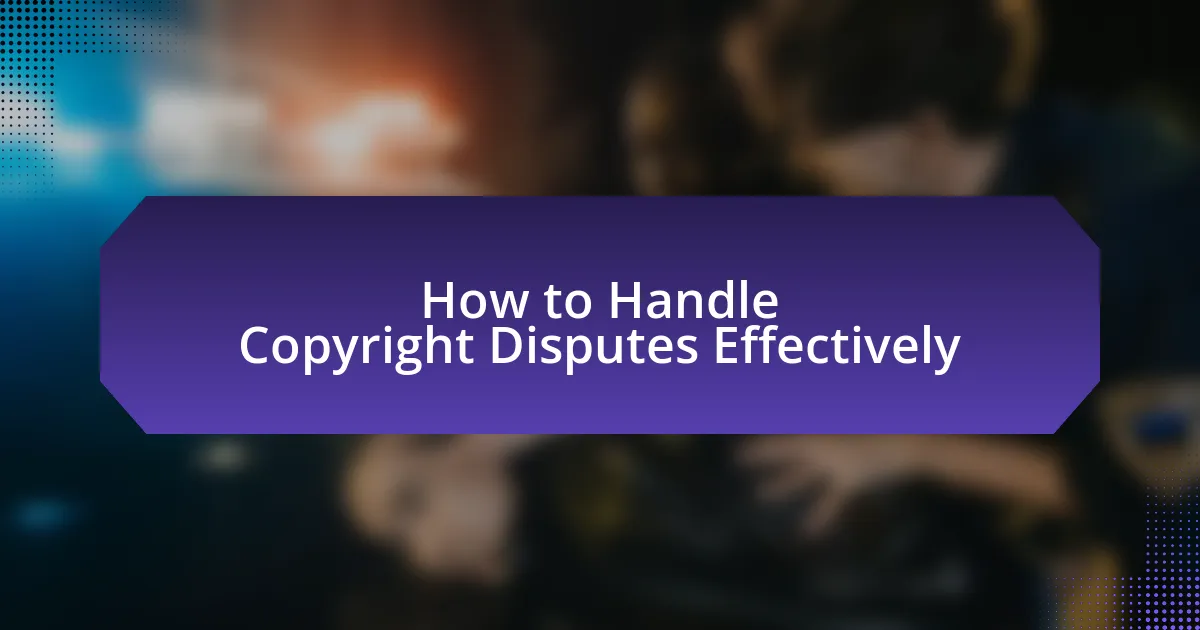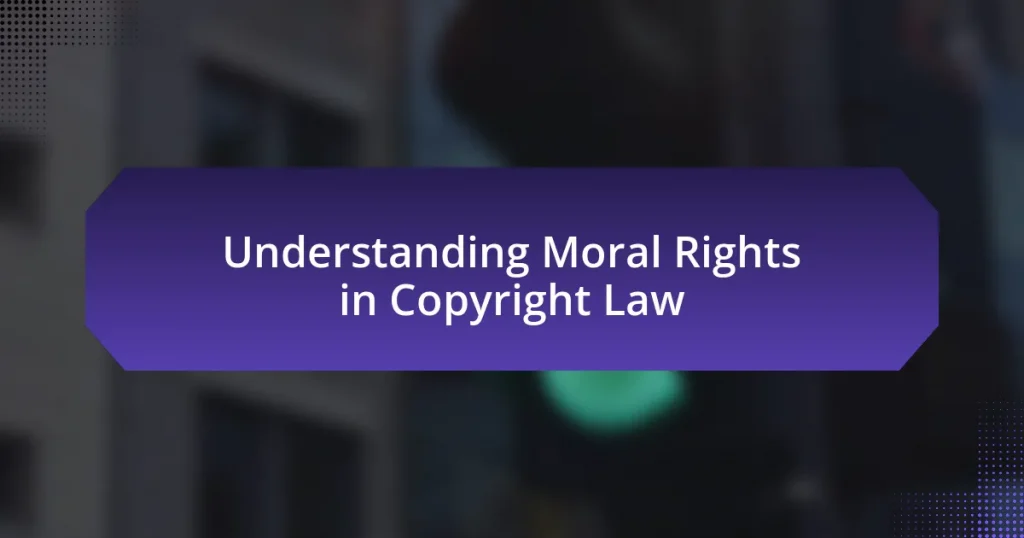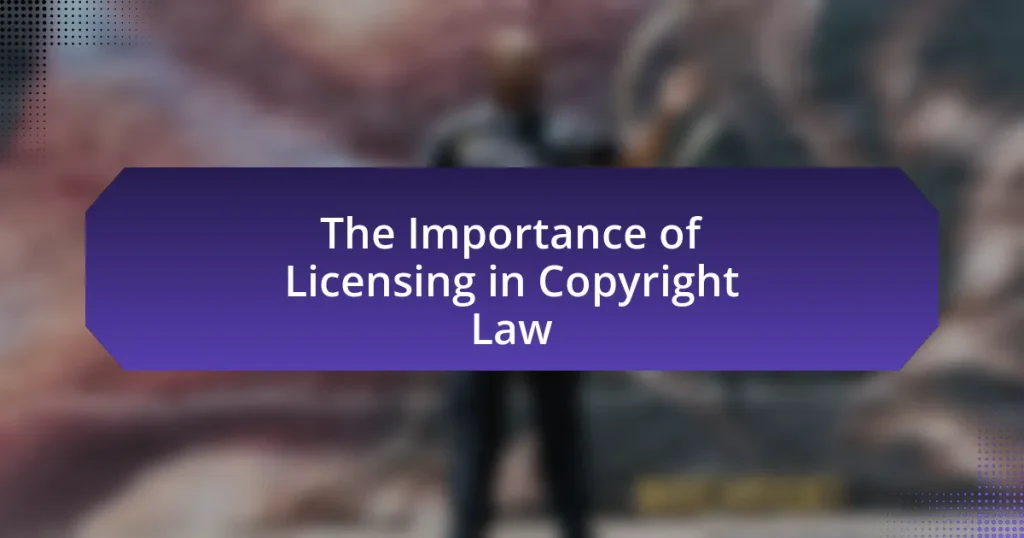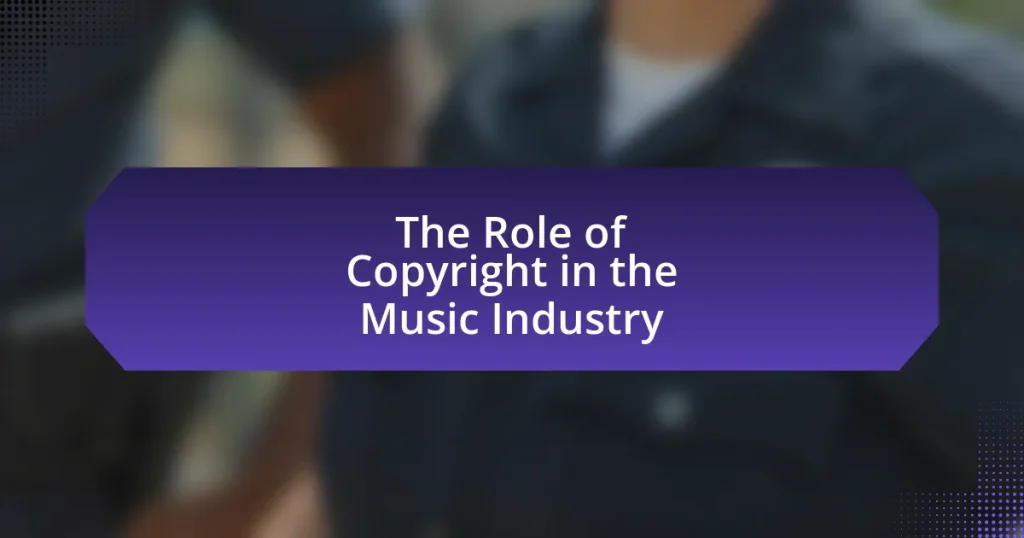Copyright disputes are legal conflicts that occur when one party claims that another has infringed upon their copyright, often involving unauthorized reproduction, distribution, or public display of copyrighted works. These disputes can arise from various scenarios, including unauthorized use of music in films or digital distribution of protected material. Effective handling of copyright disputes is essential to protect intellectual property rights, minimize legal costs, and foster a culture of respect for creativity. The article outlines the steps to manage copyright disputes, the importance of documentation, strategies for resolution such as negotiation and mediation, and the resources available to assist creators and businesses in navigating these complex legal challenges.
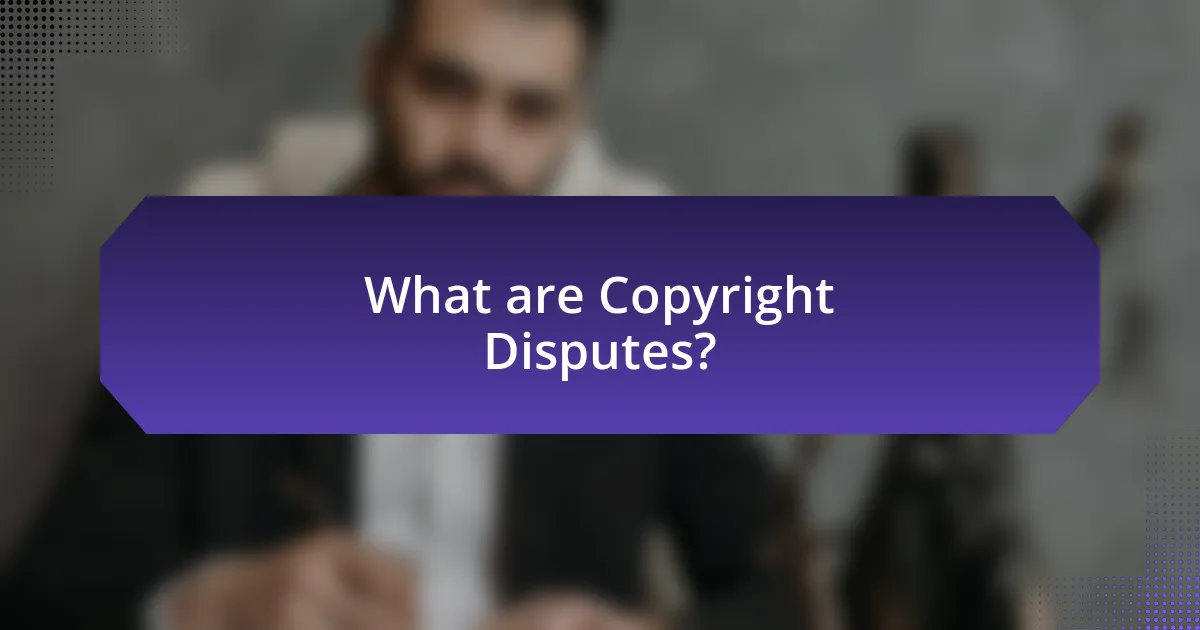
What are Copyright Disputes?
Copyright disputes are legal conflicts that arise when one party claims that another party has infringed upon their copyright. These disputes typically involve issues such as unauthorized reproduction, distribution, or public display of copyrighted works. For instance, a musician may file a copyright dispute against another artist for using their song without permission, leading to potential legal action to resolve the infringement. Such disputes can be resolved through negotiation, mediation, or litigation, depending on the circumstances and the willingness of the parties to reach an agreement.
How do copyright disputes arise?
Copyright disputes arise when two or more parties claim rights over the same copyrighted work or when one party believes another has infringed upon their copyright. These disputes can occur due to unauthorized use, reproduction, or distribution of copyrighted material, often leading to legal challenges. For instance, a common scenario involves an artist alleging that their music has been used without permission in a film, prompting a dispute over ownership and rights. According to the U.S. Copyright Office, copyright infringement can result in significant legal consequences, including monetary damages and injunctions against further use.
What common scenarios lead to copyright disputes?
Common scenarios that lead to copyright disputes include unauthorized reproduction of copyrighted works, derivative works created without permission, and infringement through digital distribution. Unauthorized reproduction occurs when individuals or entities copy and distribute protected material without the copyright holder’s consent, which is a frequent issue in publishing and media. Derivative works, such as adaptations or modifications of original content, can lead to disputes if created without proper licensing. Digital distribution, particularly through online platforms, often results in copyright infringement when users share or download copyrighted material without authorization. These scenarios are supported by numerous legal cases, such as the landmark case of “Campbell v. Acuff-Rose Music, Inc.,” which highlights the complexities of fair use and derivative works in copyright law.
How do different types of copyright works affect disputes?
Different types of copyright works significantly influence the nature and resolution of disputes. For instance, literary works, musical compositions, and visual arts each have distinct legal protections and implications in disputes, affecting how infringement is assessed and remedied. Literary works often involve textual interpretation, while musical compositions may include both lyrics and melodies, complicating claims of originality and ownership. Visual arts can involve issues of reproduction rights and moral rights, which vary by jurisdiction. The specific type of work determines the applicable laws and precedents, influencing the strategies employed in dispute resolution. For example, the Berne Convention outlines protections for various types of works, establishing a framework that guides how disputes are handled internationally.
Why is it important to handle copyright disputes effectively?
Handling copyright disputes effectively is crucial to protect intellectual property rights and maintain the integrity of creative industries. Effective resolution minimizes legal costs and time, allowing creators to focus on their work rather than prolonged litigation. According to the U.S. Copyright Office, resolving disputes efficiently can lead to quicker access to remedies and reduce the risk of infringement, which can harm both the original creator and the market. Additionally, effective handling fosters a culture of respect for copyright, encouraging innovation and creativity within the industry.
What are the potential consequences of unresolved copyright disputes?
Unresolved copyright disputes can lead to significant legal and financial consequences for the parties involved. These consequences may include costly litigation, loss of revenue due to unauthorized use of copyrighted material, and potential damages awarded by courts, which can reach substantial amounts. For instance, a study by the U.S. Copyright Office indicated that copyright infringement cases can result in damages ranging from $750 to $30,000 per work infringed, and up to $150,000 for willful infringement. Additionally, unresolved disputes can damage reputations and hinder future business opportunities, as companies may be viewed as untrustworthy or non-compliant with intellectual property laws.
How can effective handling of disputes benefit creators and businesses?
Effective handling of disputes benefits creators and businesses by fostering trust and maintaining relationships, which can lead to increased collaboration and innovation. When disputes are resolved efficiently, creators can focus on their work without the distraction of ongoing conflicts, while businesses can protect their intellectual property and avoid costly litigation. Research indicates that companies with effective dispute resolution mechanisms experience 30% lower legal costs and improved employee morale, which ultimately enhances productivity and profitability.
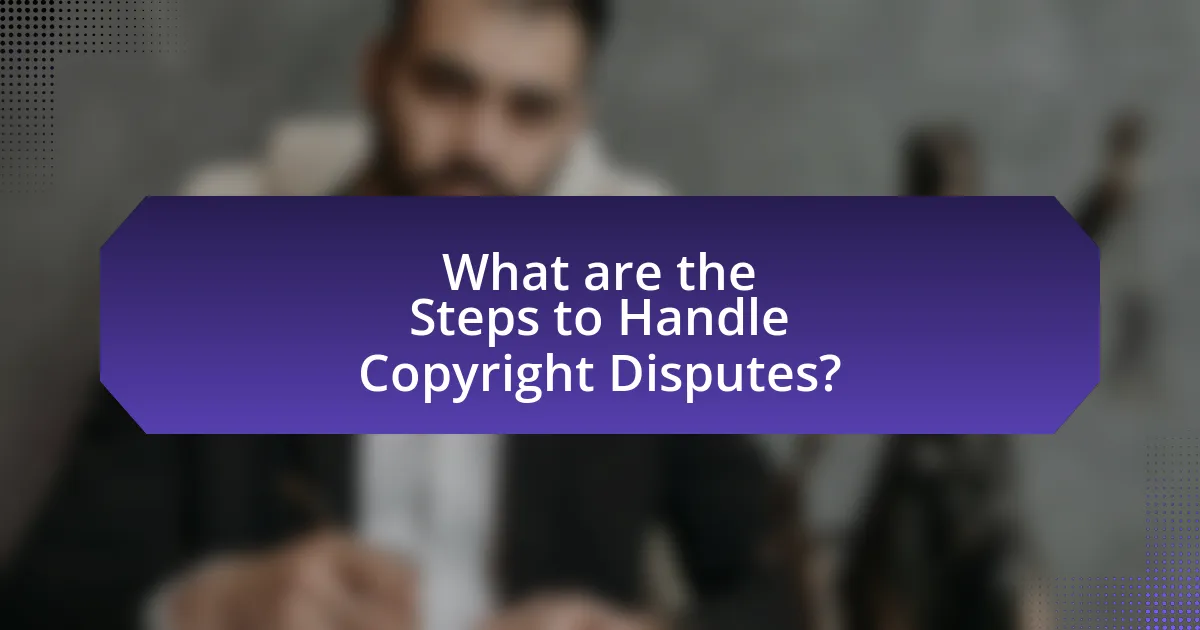
What are the Steps to Handle Copyright Disputes?
To handle copyright disputes effectively, follow these steps: First, identify the nature of the dispute by gathering all relevant documentation, including the original work and evidence of infringement. Next, attempt to resolve the issue informally by contacting the alleged infringer to discuss the matter and seek a resolution. If informal resolution fails, consider sending a formal cease-and-desist letter outlining the infringement and requesting compliance. Should the dispute remain unresolved, file a complaint with the appropriate copyright office or pursue legal action in court. Each step is crucial for establishing a clear path to resolution and protecting copyright interests.
How should one prepare for a copyright dispute?
To prepare for a copyright dispute, one should gather all relevant documentation, including original works, registration certificates, and any correspondence related to the copyright. This preparation is crucial because having clear evidence of ownership and the timeline of creation can significantly strengthen a case. According to the U.S. Copyright Office, registering a work provides legal advantages, including the ability to sue for statutory damages and attorney’s fees. Additionally, consulting with a legal expert specializing in intellectual property law can provide strategic insights and help navigate the complexities of copyright law.
What documentation is essential for a copyright dispute?
Essential documentation for a copyright dispute includes proof of ownership, such as registration certificates, original works, and any agreements related to the work. Additionally, evidence of infringement, like copies of the infringing work and records of its distribution, is crucial. These documents substantiate claims and help establish the validity of the copyright and the extent of the infringement, which is vital in legal proceedings.
How can one assess the strength of their copyright claim?
To assess the strength of a copyright claim, one must evaluate the originality of the work, the fixation of the work in a tangible medium, and the ownership of the copyright. Originality requires that the work contains a minimal degree of creativity, while fixation means the work must be captured in a form that is perceptible either directly or with the aid of a machine. Ownership is established through creation or transfer of rights, such as through a written agreement. Additionally, examining the existence of any prior registrations with the U.S. Copyright Office can further substantiate the claim, as registered works benefit from a presumption of validity in legal disputes.
What strategies can be employed to resolve copyright disputes?
Mediation and negotiation are effective strategies to resolve copyright disputes. These approaches allow parties to communicate directly, facilitating a mutually agreeable solution without the need for litigation. Mediation involves a neutral third party who helps guide the discussion, while negotiation allows the parties to reach an agreement on their own terms. According to the American Arbitration Association, mediation can lead to a resolution in over 70% of cases, demonstrating its efficacy in resolving conflicts amicably. Additionally, arbitration serves as another strategy, where an arbitrator makes a binding decision based on the evidence presented, providing a quicker resolution than traditional court proceedings.
How does negotiation play a role in resolving disputes?
Negotiation is a critical mechanism for resolving disputes as it allows parties to communicate their interests and reach mutually acceptable solutions. In the context of copyright disputes, negotiation can facilitate a dialogue that helps clarify misunderstandings, identify common ground, and explore creative solutions that may not be available through litigation. Research indicates that approximately 70-90% of disputes are resolved through negotiation rather than formal legal processes, highlighting its effectiveness in achieving satisfactory outcomes for all involved parties.
What are the benefits of mediation and arbitration in copyright disputes?
Mediation and arbitration offer significant benefits in copyright disputes by providing faster, cost-effective, and confidential resolution processes. These alternative dispute resolution methods reduce the time and expenses associated with traditional litigation, which can be lengthy and costly; for instance, arbitration can resolve disputes in a matter of months compared to years in court. Additionally, mediation allows parties to maintain control over the outcome, fostering collaborative solutions that can preserve relationships, which is particularly valuable in creative industries. Furthermore, both mediation and arbitration are private, protecting sensitive information and trade secrets from public exposure, unlike court proceedings that are typically public. These advantages make mediation and arbitration effective tools for resolving copyright disputes efficiently and amicably.
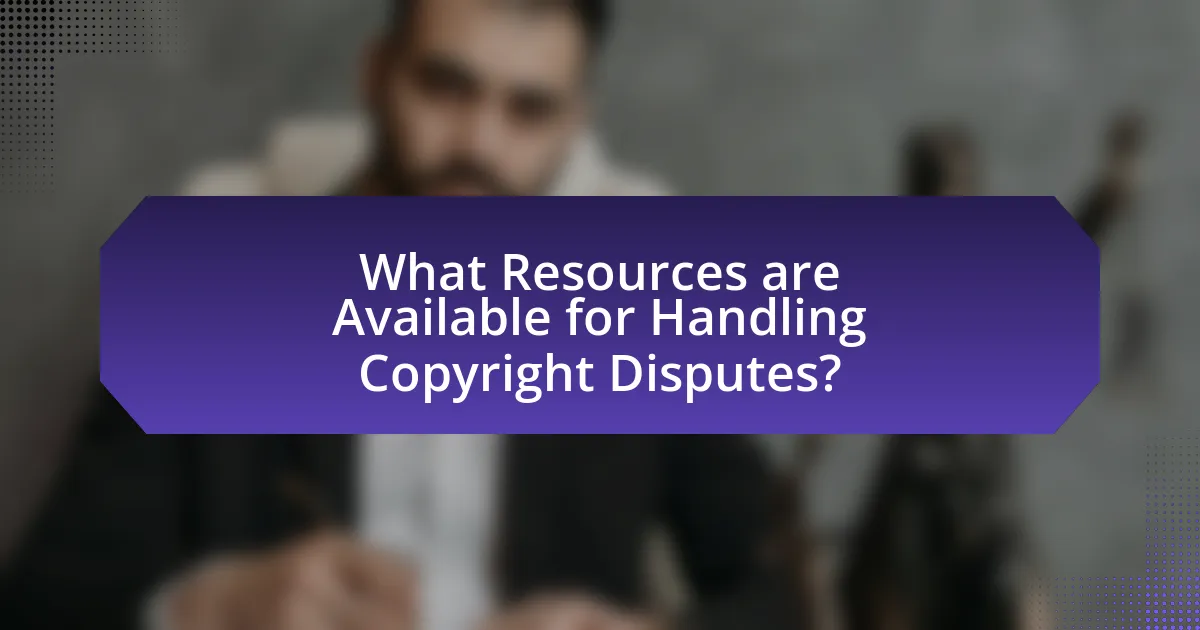
What Resources are Available for Handling Copyright Disputes?
Resources available for handling copyright disputes include legal counsel, mediation services, and copyright offices. Legal counsel provides expert advice on copyright law and representation in disputes, while mediation services facilitate negotiations between parties to reach a resolution without litigation. Copyright offices, such as the U.S. Copyright Office, offer guidance on copyright registration and dispute resolution processes. These resources are essential for effectively navigating copyright disputes and ensuring compliance with legal standards.
What legal resources can assist in copyright disputes?
Legal resources that can assist in copyright disputes include copyright attorneys, mediation services, and the U.S. Copyright Office. Copyright attorneys provide specialized legal advice and representation, helping individuals and organizations navigate the complexities of copyright law. Mediation services offer a platform for parties to resolve disputes amicably without resorting to litigation, which can be time-consuming and costly. The U.S. Copyright Office serves as a governmental body that provides information on copyright registration and enforcement, and it also offers resources for dispute resolution. These resources are essential for effectively managing and resolving copyright disputes.
How can copyright attorneys help in dispute resolution?
Copyright attorneys assist in dispute resolution by providing legal expertise and representation in copyright-related conflicts. They analyze the specifics of the case, ensuring that the rights of their clients are protected under copyright law. These attorneys can negotiate settlements, draft legal documents, and represent clients in court if necessary, leveraging their knowledge of copyright statutes and case law to advocate effectively. Their involvement often leads to more favorable outcomes, as they can navigate complex legal frameworks and facilitate communication between disputing parties, thereby reducing the likelihood of prolonged litigation.
What role do copyright organizations play in supporting creators?
Copyright organizations play a crucial role in supporting creators by managing and enforcing their intellectual property rights. These organizations, such as the American Society of Composers, Authors and Publishers (ASCAP) and the Copyright Clearance Center, collect licensing fees on behalf of creators, ensuring they receive compensation for the use of their work. Additionally, they provide legal assistance and resources to help creators navigate copyright disputes, thereby protecting their rights and interests in a complex legal landscape. For instance, in 2020, ASCAP distributed over $1 billion in royalties to its members, demonstrating their effectiveness in supporting creators financially.
What practical tips can help in effectively managing copyright disputes?
To effectively manage copyright disputes, parties should prioritize clear communication and documentation. Establishing open lines of dialogue can facilitate resolution and prevent escalation. Additionally, maintaining thorough records of all relevant materials, including original works and any correspondence related to the dispute, is crucial for substantiating claims. Engaging legal counsel experienced in copyright law can provide strategic guidance and help navigate complex legal frameworks. Furthermore, exploring alternative dispute resolution methods, such as mediation or arbitration, can lead to quicker and less adversarial outcomes. These strategies are supported by the fact that many copyright disputes are resolved outside of court, saving time and resources.
How can one maintain clear communication during a dispute?
To maintain clear communication during a dispute, one should actively listen and articulate thoughts clearly. Active listening involves fully concentrating on the speaker, understanding their message, and responding thoughtfully, which fosters an environment of respect and clarity. Articulating thoughts clearly means expressing concerns and viewpoints in a straightforward manner, avoiding jargon or ambiguous language. Research indicates that effective communication can reduce misunderstandings by up to 70%, highlighting its importance in resolving disputes.
What are the best practices for documenting interactions related to disputes?
The best practices for documenting interactions related to disputes include maintaining detailed records of all communications, including dates, times, and participants involved. This practice ensures that there is a clear timeline and context for each interaction, which is crucial in resolving disputes effectively. Additionally, using a standardized format for documentation, such as templates for emails or meeting notes, can enhance clarity and consistency. It is also important to capture the content of discussions accurately, including any agreements or disagreements, to provide a comprehensive account of the interactions. Finally, storing all documentation in a secure and organized manner allows for easy retrieval and reference during the dispute resolution process.
